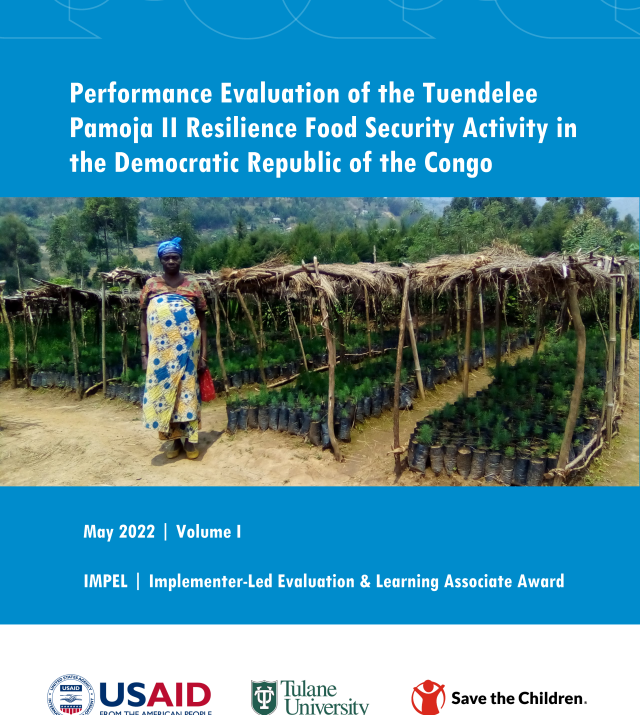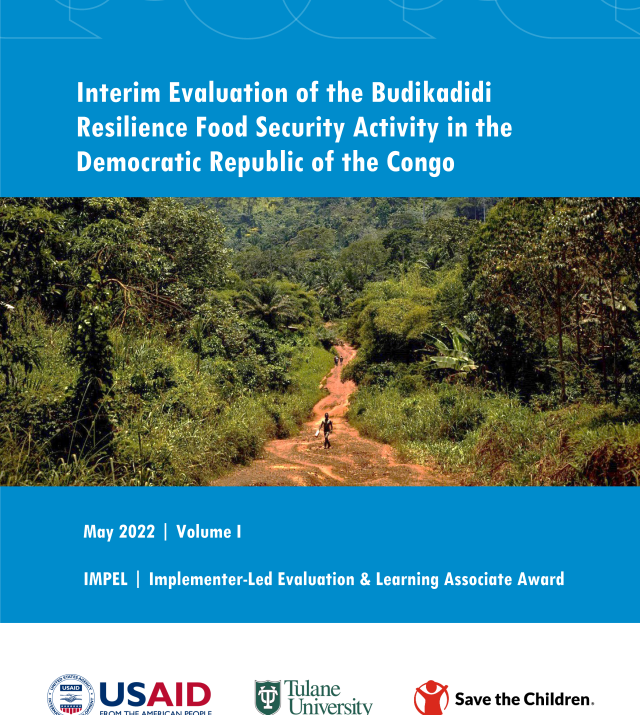
Performance Evaluation: Food Security Project (FSP)-Enyanya Resilience Food Security Activity in the Democratic Republic of the Congo

Overview
To assist vulnerable populations of South Kivu, the United States Bureau for International Development’s (USAID) Bureau for Humanitarian Assistance (BHA) awarded Mercy Corps the implementation of a 5-year Resilience Food Security Activity (RFSA) from September 2016–September 2021, and later granted a 2-year extension through 2023. The South Kivu Food Security Project (FSP)-Enyanya RFSA operates in three health zones (Kalehe (territory of Kalehe), Miti-Murhésa, and Katana (territory of Kabare)) with a life of award budget of approximately $62 million. The FSP-Enyanya RFSA’s overall goal is “improved food and nutrition security and economic well-being of vulnerable households in South Kivu” and targets approximately 36,000 households.
Interim Evaluation
In 2021, under the USAID BHA Implementer-Led Evaluation and Learning (IMPEL) Associate Award with Save the Children, Tulane University School of Public Health and Tropical Medicine (Tulane) was subcontracted to conduct an interim evaluation, including a population-based survey (PBS) and a resilience assessment of the FSP-Enyanya RFSA. This PBS collected representative data on a number of lower-level outcomes from 1,349 households and nearly 8,000 individuals in July/August 2021.
The PBS serves as the second phase of a pre-post survey cycle, with data on the same indicators collected in both survey rounds. Statistically detecting changes (if any) for all practice and behavioral change indicators at the population level (the FSP-Enyanya RFSA coverage area) can help inform the performance of the award to date. It should be noted that the evaluation does not include data from areas in which the intervention was not implemented (i.e., a counterfactual). While the evaluation results can be used to help explain differences between the pre- and post-values and may therefore help inform overall performance, true attribution is only possible with experimental and quasi-experimental evaluation designs, which are not being used in this evaluation.
Interim Evaluation Brief
Prepared by Tulane University School of Public Health and Tropical Medicine, this brief summarizes the results of the interim evaluation published in 2022. Overall, the interim evaluation shows the FSP-Enyanya’s RFSA in the Democratic Republic of the Congo (DRC) in a positive light, identifying several promising areas where lower-level outcome indicators appear to be moving in the correct direction, and self-reported direct participation in RFSA activities is frequently associated with improvements. However, results at the population level do not consistently show the expected significant improvements.
Mid-Term Evaluation
The mid-term evaluation (MTE) aimed to assess the quality of program service delivery, identify evidence of changes to date due to FSP-Enyanya’s interventions, assess the quality, relevance and efficacy of FSP-Enyanya’s design, assess the degree and benefits of efficacious coordination, collaboration, and convergence with locally-based partners and external organizations, assess early evidence of sustainability produced by FSP-Enyanya interventions, assess the appropriateness and quality of the R&I approach, determine the appropriateness and effectiveness of interventions focused on cross-cutting themes and recommend adjustments to FSP-Enyanya implementation or design.
Mid-Term Evaluation Brief
Prepared by Tulane University School of Public Health and Tropical Medicine, this brief summarizes the results of the 2019 mid-term evaluation. The evaluation identifies several areas where FSP-Enyanya has had important successes, as well as areas where opportunities to improve and learn can inform FSP-Enyanya and other DFSAs.
